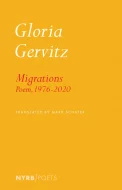 Gloria Gervitz
Gloria Gervitz
Migrations: Poem, 1976-2020
Translated by Mark Schafer
New York Review Books
Reviewer: Maria Rouphail
Truth be told, until Mark Schafer’s translation of Migrations (Migraciones) I had never read anything by the late Mexican poet, Gloria Gervitz (1943-2021). Fault the chasms in my education (I have a doctorate in the literature of the United States) or my proclivities (I’ve customarily read Latin American fiction from the 1930s to the end of the twentieth century). I hadn’t heard of Gervitz, despite being quite familiar with a number of women poets from Latin America. To be sure, the Mexican Sor Juana Ines de la Cruz (1648-95) whose career overlapped that of New England’s Anne Bradstreet (1612-72) topped my list. Chile’s Lucila Godoy y Alcayaga, aka Gabriela Mistral (1889-1957) was and is iconic. But Gervitz? Mea culpa.
Farrar, Strauss and Giroux’s 2011 update of their bilingual mega-anthology, The FSG Book of Twentieth-Century Latin American Poetry (Ilan Stavans, ed.) presents the works of numerous women including Nancy Morejon (Cuba), Violeta Parra (Chile), and Claribel Alegria (El Salvador), to name a very few. It also includes a 2002 version of Gloria Gervitz’s “Shajarit.” Schafer was Gervitz’s translator here, as well. “Sharjarit,” as it happens, is the precursor and seed of what would emerge as Gervitz’s master work, Migraciones (Migrations), a single, unbroken poem spanning the poet’s lifetime. For Gervitz wrote, revised, and reframed her magnum opus beginning in 1976, aged 24. And she continued to shape it until her death in 2021.
Over the decades, she published Migraciones in different forms and states of completion. But Gervitz wanted us to regard the 2021 version (and Schafer’s translation, Migrations) as final, even though her long-time readers might remember—and perhaps even prefer—other, very different iterations. And she was fine with that possibility. Indeed, in what is more of a conversation between close friends than an academic interview, Gervitz told Shafer, “I would have liked to have had the poem the way it is now, which is the one I prefer. But I can’t deny the others, just as I cannot deny other parts of my life” (“Afterward,” 274).
The question of extant prior versions of Migraciones (Migrations) should not be problematic for the first-time reader of Shafer’s “poet-approved” translation. The text of the poem itself is 263 pages of free verse in various voices and tones. The poet seems to be addressing a number of female entities: her dead mother, her nanny, God(ess), herself, the “woman within,” the female-about-to-be-born (yes, in late life). The tone throughout is ecstatic, even when it mourns a loss or complains about missteps or misjudgments. The poem is a confession or chant to a mysterious “Other” with whom the poet is in ongoing, unbroken dialogue. Some readers (like me) will be enchanted, seduced by the sheer athleticism of Gervitz’s lyrical leaps. Others might be offput by the poem’s deceptive aimlessness.
What must be taken into account from the start is Gervitz’s unique position as a member of the Jewish diaspora in Mexico. This cultural marriage gives Migrations its enormous lyrical verve. Descended from Eastern European Jews who fled the pogroms, Gervitz blends the liturgical prayer traditions of Judaism with those of Catholicism and with vibrant imagery of the Mexican countryside, village, and marketplace. Migrations is, perhaps, one long ecumenical praise poem, even when it laments. It is a prayer, a chant of thanksgiving for all that is and all that happens to us, even death.
Gervitz and Shafer, long-time collaborators in bringing her work to Anglophone readers, provide an “Afterward: Conversation(s)s (2004, 2021)” in which each queries the other as to their ideas and attitudes about poetry, religious tradition, gender, sexuality, the act or writing, and translating. I find this section utterly riveting. I especially appreciate Gervitz’s wisdom regarding age and creativity, especially at a time when the elderly are routinely disparaged:
Starting in 2014 and lasting perhaps until 2018 or the beginning of 2019, I had what was probably the most creative stage of my life. [. . .] I would say that time has been an incredible friend, to the poem and to me, though I would say that [the dry periods] [were] quite frustrating. [ . . .] Now I see that one of the big things that helped me was time itself. (278)
Take heart, seniors and young ’uns : nobody writes their magnum opus at 24.
The third feature of Schafer’s translation is the ample lexicon, an indispensable aid in absorbing the numerous intercalations of Hebrew, Arabic, Greek, and Spanish (for non-Hispanophone readers).
And the poem itself? It is like a warm sea into which the reader is immersed head-to-toe. Start at the beginning. Start anywhere. And because I take what I want as a touchstone, I will share this gorgeous set (78, 157):
mother I’m the one I seek
I’ve carried you on my back
feeling your weight
and oblivion aches in me
like a wound
the light hushed
and I heard you inside me
heard you at the breach
being born
[ . . . ]
and I who am made of words
have no words
and my heart drops
into the heart of God himself
and I tremble in your presence
in my desire for you
to be in you
as in God
Having just completed All the Way to China, my own book of poems on the theme of motherhood and daughterhood, I can only rejoice in Gervitz’s superlative poem. I feel a kinship with her. I also think of Isaiah, John of the Cross, Teresa of Avila, Rabbi Zusya, Tillie Olsen, Zbigniew Herbert, and novelist Clarice Lispector (Brazil, 1920-77). Lispector, especially, who in Agua Viva (The Stream of Life) said that writing is like entering into a state of grace, which is an irresistible terra incognita: “My roots are in the divine shadows. Somnolent roots. Wavering in the darkness.”

